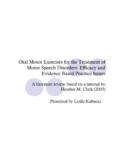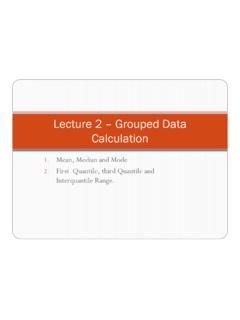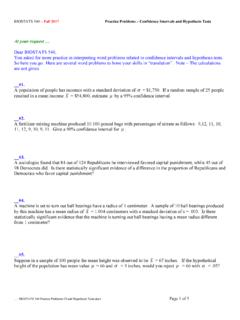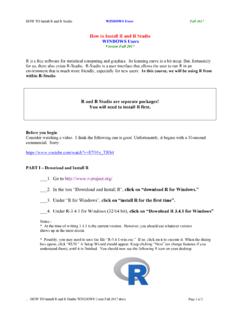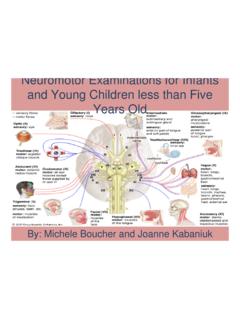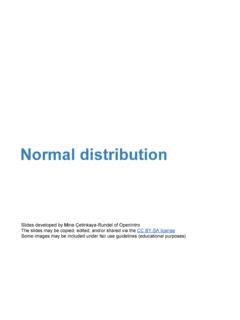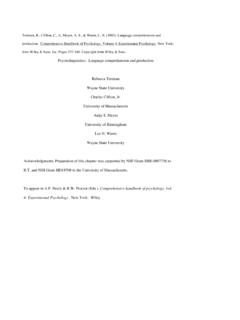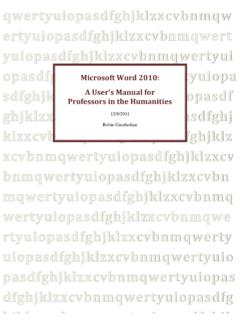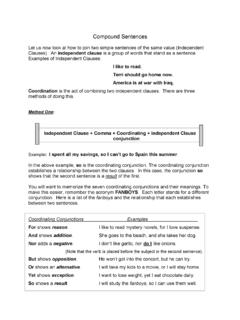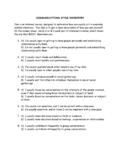Transcription of Introduction: What is Language? What does it …
1 1 introduction : what is language ? what does it mean to know a language ? Linguistics 201 Professor Oiry 1. Human Specialization for language Our speech organs were and are directly concerned with breathing and eating. However, they have also become highly specialized for use in language . Their structure and shape is unique to our species, as is the highly developed network of neural pathways that exercises control over them during speech production. Lungs Vocal cords Tongue Teeth Lips Nose Human beings are also especially equipped for the perception of speech. Newborn respond differently to human voices than to other types of sounds, and 6-month-old infants are able to perceive subtle differences among sounds in languages that they never heard before.
2 2. Creativity what does it mean to know a language ? In order to answer this question, it is first necessary to understand the resources that a language makes available to its native speakers, those who have acquired it as children in a natural setting. Because communication is not restricted to a fixed set of topics, language must do something more than provide a package of ready-made messages. It must enable us to produce and understand new words and sentences as the needs arise. The creativity of language goes hand in hand with a second defining characteristic the presence of systematic constraints that establish the boundaries within which innovation can occur.
3 You know a lot of things about the structure of the English language . In fact, I dare say you know everything there is to know about it. Systematic constraints are the hallmark of all aspects of language . Consider the way in which sounds are combined to form words. To give you a first impression, do the following exercises: 2 (1) Classify the following words into three categories: English words, words that are not English but could be, or impossible English words. English word Possible word Impossible bnick brick blick btick botick trick tlick tnick nbid glind mgind (2) Fill in the blanks in the following sentences with any word that makes sense.
4 A. Harry has a blick cat. And I really like his blick _____, too. b. John ate sixteen fertuples, and his girlfriend ate _____ fertuples. These words are nonsense, but what happened when you were asked to put a word next to it? How did you know what kind of words could go with it? (3) Fill in the blanks with forms of the nonsense words given. a. I have one wug, and you have two _____. b. My car is old and grish. It drives really _____. c. I like to tunick. I am _____ right now, and I _____ yesterday, too. So your quality of native speaker allows you to recognize possible words from impossible ones. what about sentences? (4) Classify each of the sentences below in one of three categories: (i) a good, normal, possible sentence of English that makes sense; (ii) a sentence that is just nonsense (but is a sentence nonetheless); (iii) a sentence that is not possible at all in English (say whether you can glean from these impossible sentences some meaning?)
5 what are they trying to say?) 3 what is the difference between a nonsense sentence and a sentence that is simply impossible? what s wrong with the nonsense sentences? what s wrong with the impossible sentences? 3. Grammar and linguistic competence Speakers of a language are able to produce and understand an unlimited number of utterances, including many that are novel and unfamiliar. At the same time, they are able to recognize that certain utterances are not acceptable and simply do not belong to their language . This ability is often called linguistic competence, constitutes the central matter of linguistics. In investigating linguistic competence, linguists focus on the mental system that allows human beings to form and interpret the sounds, words, and sentences of their languages.
6 Linguists call this system a grammar and often break it down in to the components in (1): (1) Phonetics: The study of physical sounds. How do we produce sounds? How are sounds transmitted from one person s mouth to another person s ear? How do we perceive sounds? Phonology: The study of how people manipulate sounds. what are the possible sounds in a particular language ? what are the possible combinations? How do we manipulate sounds? Morphology: The study of word structure and word formation. How do we make (new) words? Is there an internal structure of words? If so, what does it look like? Syntax: The study of sentence structures. How do we combine words to make a sentence?
7 Good Nonsense Impossible what house did you wonder who built? Colorless green ideas sleep furiously. Ideas colorless sleep green furiously. So, like, are you IMing him or what ? Hamburgers some John devoured quickly they. Mary thinks I don t like herself. Happy paperclips usually write doughnuts out of the sky. There s many people I wanna talk to. The horse that is racing past the barn fell. The horse raced past the barn fell. Run children the school of out. 4 Are there any rules? Semantics: The study of meaning. How do we understand the meaning of individual sentences? Pragmatics: The study of the role of context in language use. How does the context affect the way utterances are understood?
8 The grammar is a system that combines small pieces of language into large ones. This allows us to judge what is and is not a possible word, sound, sentence even if we haven t heard or read such combinations before. Every native English speaker s grammar has encoded that English words cannot begin with pairs of consonant sounds like bn or mb or mg (as we saw in the exercise above). In the second group of questions in the exercise, you were given nonsense words but you nevertheless knew certain things about them. We want that knowledge to be part of your grammar as well. You knew, subconsciously, that blick had the properties of an adjective, like grey or happy, since it occurred in the position that adjectives do: a ___ cat.
9 We have evidence that you knew it was an adjective because you chose a noun, the category of words nouns modify, in the blank spot. And in the last set of questions about whole sentences, we discovered that your knowledge of English allows you to judge that some sentences, ones you never heard before, could never be possible sentences. 4. All languages have a grammar It could not be any other way. If a language is spoken, it must have a phonetic and phonological system; since it has words and sentences, it must have a morphology and a syntax; and since these words and sentences have systematic meanings, there must obviously be semantic principles as well.
10 In other words, each spoken language must have an intricate system of knowledge that encompasses sound and meaning as well as form and structure. 5. All Grammars are equal Contrary to popular belief, there is no such thing as a primitive grammar, even in places untouched by modern science or technology. Some people say that such-and-such languages have no grammar or less grammar . This is a myth. Indeed, some of the most complex linguistic phenomena we know about are found in societies that have neither writing nor electricity. All languages have grammar. If a language is spoken (even not written) or signed, it has a phonetic and phonological system.
